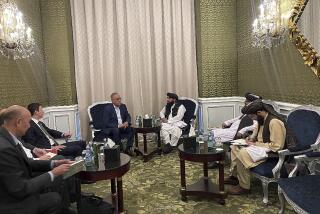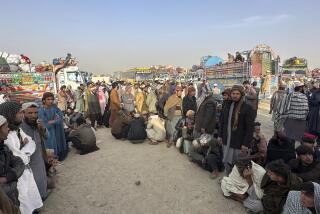Clerics Deciding Bin Laden’s Fate; Hijack Plot Was Wider, U.S. Suspects
- Share via
ISLAMABAD, Pakistan — A Pakistani delegation returned from Afghanistan on Tuesday without progress in persuading the Taliban government to turn over terrorism suspect Osama bin Laden to the West, as a mood of tension settled on the border between Pakistan and Afghanistan.
As many as 1,000 Afghan religious officials are expected to convene a council today in the city of Kandahar to decide what Afghanistan will do about Bin Laden. However, the abrupt return of the Pakistani envoys and comments by Afghan officials hinted at little change in the Taliban’s oft-stated refusal to force its “guest”--now the world’s most-wanted fugitive--out of the country.
Pakistani officials said the council, known as a shura, could last for days, raising the possibility that it could be drawn out by the Taliban to buy time to prepare for a possible U.S. attack. The meeting was to have started Tuesday but was delayed because Afghan leaders said they needed more time to allow the scholars to gather.
The Taliban, a fundamentalist Islamic movement that controls 95% of Afghanistan, has sheltered Bin Laden since 1996. The Saudi-born Bin Laden is viewed by the Bush administration as a prime suspect in last week’s attacks on Washington and New York.
The Pakistani delegation flew to Afghanistan on Monday and met with top Taliban officials, first in the movement’s spiritual center of Kandahar and later in the capital, Kabul.
The delegation was led by Pakistani intelligence chief Lt. Gen. Mahmood Ahmed, in the past a close friend of the Taliban fighters. The Pakistanis carried a message to Mullah Mohammed Omar, the spiritual leader of the movement, saying that Afghanistan would face massive U.S. military action unless it cooperates in turning over Bin Laden.
The delegation had been expected to stay in Kabul to hear the decision of the council but left Tuesday when it became clear that final word might take several days.
According to Pakistani Foreign Ministry spokesman Riaz Mohammed Khan, the delegation took a letter from President Pervez Musharraf to Omar telling the Taliban in “stark terms about the gravity of the situation and what the international community expects of the Afghan leadership.”
But Khan denied that the Pakistani delegation had issued any sort of ultimatum or that it had hoped to bargain with the Taliban.
“The purpose of the delegation was not negotiation,” he said. “This is an effort of friends of Afghanistan to convey to the Afghan leadership our assessment of the situation and our view about what needs to be done.”
A Pakistani Foreign Ministry source said the delegation also told the Taliban leaders that Bin Laden’s “associates” must be expelled. Bin Laden is thought to have a core of several dozen colleagues with him in Afghanistan, along with hundreds and perhaps thousands of loyal young fighters protecting him.
With fears of a U.S. attack rising, Khan said “hundreds of thousands” of Afghans already are on the move inside the country, trying to flee but frustrated by borders being closed.
The three main countries that have served as havens for refugees from Afghanistan’s decades of warfare--Iran, Pakistan and Tajikistan--all say they cannot absorb any more.
Khan said Pakistan has closed border crossings to refugees, but he could not rule out that some would flee across mountain paths that the Pakistani government cannot patrol.
Journalists who visited the main crossing west of Peshawar on Tuesday reported a mood of heightened tension, with military escorts telling them to leave and that they could not guarantee their safety.
Meanwhile, Musharraf scheduled a national television address this evening to explain his decision to side with the U.S. and to call for unity.
His military government has been highly conscious of the potential for widespread rioting if the U.S. attacks Afghanistan with Musharraf’s cooperation.
The News of Pakistan newspaper, citing anonymous senior military sources, reported “indications” that the United States might want to use two Pakistani airports, in Peshawar and Quetta, near the Afghan border as emergency standby bases for airborne operations that would likely be launched from U.S. carriers in the Arabian Sea and from Bahrain.
The newspaper pointed out that both airports are only minutes flying time from Kabul and Kandahar. The Peshawar airport was built by the U.S. government during the early years of the Cold War and was the base from which U.S. pilot Francis Gary Powers made his U-2 flight over the Soviet Union that ended in a shoot-down.
A senior Pakistani navy source cited by the paper also said there is U.S. naval activity off Pakistan’s Mekran coast that is “unprecedented . . . in recent years.”
A Taliban spokesman was quoted by Reuters news agency as saying that the Afghan leaders might in theory turn over Bin Laden, but only if he was proved guilty.
Information Minister Qudrutullah Jamal said in Kabul: “We told them [the Pakistani delegation] to give us proof that he did it, because without that, how can we give him up?”
More to Read
Sign up for Essential California
The most important California stories and recommendations in your inbox every morning.
You may occasionally receive promotional content from the Los Angeles Times.













